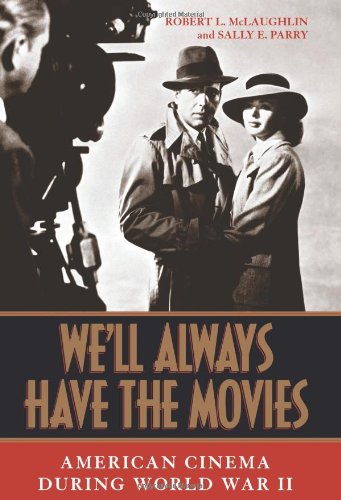(Ebook) We'll Always Have the Movies: American Cinema during World War II by Robert L. McLaughlin, Sally E. Parry ISBN 9780813123868, 9780813171371, 0813123860, 0813171377
We'll Always Have the Movies explores how movies made in Hollywood during World War II were vehicles for helping Americans understand the war. Far from being simplistic, flag-waving propaganda designed to evoke emotional reactions, these films offered audiences narrative structures that formed a foundation for grasping the nuances of war. These films asked audiences to consider the implications of the Nazi threat, they put a face on both our enemies and allies, and they explored changing wartime gender roles. We'll Always Have the Movies reveals how film after film repeated the narratives, character types, and rhetoric that made the war and each American's role in it comprehensible. Robert L. McLaughlin and Sally E. Parry have screened more than 600 movies made between 1937 and 1946 -- including many never before discussed in this context -- and have analyzed the cultural and historical importance of these films in explaining the war to moviegoers. Pre-Pearl Harbor films such as Sergeant York, Foreign Correspondent, and The Great Dictator established the rationale for the war in Europe. After the United States entered the war, films such as Air Force, So Proudly We Hail! and Back to Bataan conveyed reasons for U.S. involvement in the Pacific. The Hitler Gang, Sahara, and Bataan defined our enemies; and Mrs. Miniver, Mission to Moscow, and Dragon Seed defined our allies. Some movies -- The Miracle of Morgan's Creek, Hail the Conquering Hero, and Lifeboat among them -- explored homefront anxieties about the war's effects on American society. Of the many films that sought to explain the politics behind and the social impact of the war -- and why it concerned Americans -- Casablanca is perhaps one of the most widely recognized. McLaughlin and Parry argue that Rick's Caf?© Am?©ricain serves as a United Nations, sheltering characters who represent countries being oppressed by Germany. At Rick's, these characters learn that they share a common love of freedom, which is embodied in patriotism; from this commonality, they overcome their differences and work together to solve a conflict that affects them all. As the representative American, Rick Blain (Humphrey Bogart) cannot idly stand by in the face of injustice, and he ultimately sides with those being oppressed. Bogart's character is a metaphor for America, which could also come out of its isolationism to be a true world leader and unite with its allies to defeat a common enemy. Collectively, Hollywood's war-era films created a mythic history of the war that, even today, has more currency than the actual events of World War II.
*Free conversion of into popular formats such as PDF, DOCX, DOC, AZW, EPUB, and MOBI after payment.


